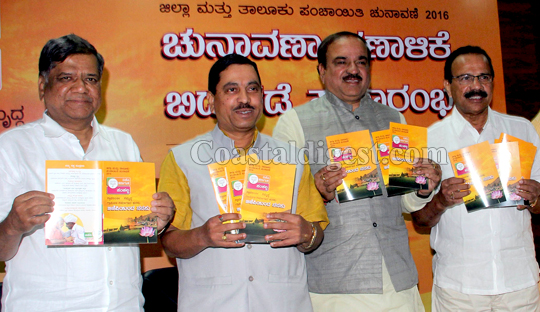Bengaluru, Feb 7: The State BJP, in its manifesto for the zilla and taluk panchayat polls, has sought to give a thrust to capacity building at the local bodies level and also take the NDA model of development to the grassroots.

Launched in the presence of State leaders in Bengaluru on Saturday, the manifesto also lists priorities across 20 sectors, including administration, social welfare, agriculture, education and housing in rural local bodies.
The elections for the zilla and taluk panchayats are scheduled to be held across 30 districts in two phases on February 13 and 20.
BJP?State president Pralhad Joshi said the Congress government had failed to keep its promise made ahead of the Assembly elections of decentralisation of administration and providing more power to panchayat raj institutions.
The NDA government has successfully launched several welfare and development schemes after coming to power in May 2014, Joshi said and added that the party would strive to replicate these schemes at the grassroots.
Former minister Vishweshwara Hegde Kageri, who headed a committee to draft the manifesto, said the document was also a pointer to BJP’s priorities to panchayat raj institutions if it comes to power in the 2018 Assembly polls. Union?Ministers Ananth Kumar, D?V?Sadananda Gowda and former ministers Suresh Kumar and R?Ashoka were among those present during the manifesto launch.
Key agenda
Pressure the government to increase annual grants to zilla and taluk panchayats to Rs 10 crore and Rs 5 crore, respectively
Eradicate corruption in panchayat bodies by setting up vigilance cells
Constitution of planning boards at ZP/TP level to chalk out annual development action plan
Construction of student hostels with good infrastructure and amenities in rural
areas
Provide thrust to solar power to energise pumpsets
Upgrading of village roads
Drinking water facilities and toilets in all rural schools
Better facilities in rural primary health centres





Comments
ha ha ha corruption!!! Vyapam Scam, Anar Patel - Gujarat Scam, Food supply scam, chikki scam-Maharastra, Modi -Rajasthan Scam. Mining scam-, land denotification - Karnataka, which corruption you are going to stop? Do you have the guts to punish these anti nationalists?
Chunavi Jumla..
Shameless liars.
Anti national pudaris
Add new comment